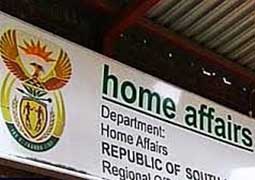
The Department of Home Affairs delivered on the commitments it made to the National Council of Provinces (NCOP) when it presented the R8.1bn 2016/17 budget last year, the Minister of Home Affairs Ms Hlengiwe Mkhize told Members of the NCOP yesterday when she delivered the Department of Home Affairs’ 2017/18 Budget Vote speech to the NCOP.
Ms Mkhize told the NCOP Members of Parliament (MPs) that the Department of Home Affairs continued to modernise itself to fully replace the systems that are outdated and not secure or efficient. She said the eHomeAffairs online application platform for Smart ID cards and passports was improved to speed up the replacement of green-barcoded IDs with Smart ID cards. “We replaced more than 2.6 million green-barcoded ID books with secured Smart ID cards over five years,” she said.
According to Ms Mkhize, the Department of Home Affairs is hoping to strengthen its partnership with the four participating banks, namely: Absa, FNB, Nedbank and Standard Bank. “In the pilot phase of eHomeAffairs, focus was in Gauteng. Thus, 13 bank branches in this partnership are in that province, with one Standard Bank branch in the Western Cape. The intention is to expand the number of participating branches going forward,” she added.
She said they invite citizens, especially the youth and first time applicants who are in Grade 12, to apply online or at their nearest Home Affairs offices for Smart ID cards and passports.
“We also committed to upgrade six of the largest land ports of entry, namely: Lebombo in Mpumalanga, Oshoek in Mpumalanga, Beitbridge in Limpopo, Maseru Bridge in the Free State, Ficksburg in the Free State and Kopfontein in the North West,” she said.
Another major achievement of the department in the last financial year was the completion of the Border Management Authority (BMA) Bill after extensive engagements within government, Nedlac (National Economic Development and Labour Council) and broader society. “The Bill was approved by Cabinet, and was recently passed by the National Assembly. I trust that as we implement the BMA Act we will continue to receive your support,” she said.
She told the NCOP MPs that as stated in the National Development Plan Vision 2030, the department directly contributes to economic restructuring, growth and job creation. “Appropriately, we have set strategic targets against an Annual Performance Plan and a realistic budget. We trust the targets for 2017/18 will contribute to achieving our strategic objectives aligned to national priorities.”
Ms Mkhize told the NCOP MPs that the goal of the BMA Bill, is among other things, to secure and protect South Africa’s borders in the national interest while meeting the country’s regional, African and global developmental commitments. “While completing the legislative process, the BMA Project Management Office will continue with the development of a detailed roadmap and blueprint. The plan is to have the BMA operational in the current financial year,” she said.
She said already an integrated border management strategy is in place, and will be implemented in phases. According to Ms Mkhize, the period 2017 to 2021 will consist of the foundation and realignment phase. “This will be followed by the consolidation and ongoing rollout phase in 2021 to 2031. The resilience and adaptation phase of the BMA will happen beyond 2031.
In supporting the 2017/18 budget of the Department of Home Affairs, the Chairperson of the Select Committee on Social Services, Ms Landulile Dlamini who is also the Permanent Delegate to the NCOP representing the Mpumalanga Province, highlighted the strides which she said were great which the department took in the last financial year on the registration of births, marriages and deaths.
She said the key target for the department is to register 750 000 births within 30 days. She said birth registration is significant because it is about identity – which is central to restoring the dignity of people regardless of gender, race and class. “Solving identity dynamics serves to open resources, social services and doors of learning for those who had been previously marginalised,” she stressed.
On the issue of the continuing violence against foreign nationals in South African townships and informal settlements, Ms Dlamini advised that there is an urgent need for social integration and co-existence among South Africans and foreign nationals. “We have heard queries regarding children barred from schools and struggling to benefit from social security programmes due to lack of required and enabling ID documents,” she said.
Also, Ms Dlamini said educators had raised challenges about the likely exclusion of children from schools due to illegal migration in certain parts of South Africa. Ms Dlamini appealed to Ms Mkhize to ensure that the Department of Home Affairs looks into these problems.
Also participating in the Budget Vote debate, Mr Christian Hattingh who is the Permanent Delegate to the NCOP representing the North West Province, said the Department of Home Affairs must be given credit on the good work of rolling out six million Smart ID cards in four years – and the quick turnaround times with passport applications.
He said this is testimony of significant and impressive achievements of the Department of Home Affairs. “Most people have forgotten that it used to take several weeks to get a passport,” he said.
For 2017/18 the total vote allocated for the Department of Home Affairs is R7.1bn, of which R1.2bn was transferred to the Independent Electoral Commission and R141m to the Represented Political Parties Fund.
By Mava Lukani
21 June 2017

